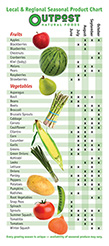The above information will be used only by Outpost Natural Foods for the express purpose of sending an e-newsletter. Outpost shopper information is never shared with other organizations or businesses.
Resources >>
Food Label Facts
Understanding a Nutrition Facts Label
Understanding the labels on food packaging is key in taking charge of your diet and health.Nutrition Terms
Calories : Calories are figured by the amount of fat, carbohydrate and protein in a food most commonly eaten.Calories From Fat : This shows how many calories from fat are contained in a product.
Calories Per Gram : Every gram of fat has 9 calories, a gram of protein has 4 calories, and every carbohydrate has 4 calories.
Cholesterol : Cholesterol is found only in animal products. Saturated fat (fat from an animal) contains cholesterol.
Daily Values : This tells you if a food contains a little or a lot of a nutrient. Percentage is based on a person consuming 2,000 calories in a day.
Dietary Fiber : Fiber is found in foods of plant origin. Fiber is a carbohydrate that is not digested and contains no calories. Soluble and insoluble fibers reduce cholesterol levels and maintain a healthy digestive tract and colon. Our diets need 25 - 35 grams of fiber daily. A product with over 3 grams of fiber is considered a good source.
Protein : Protein builds body tissues and keeps our immune systems strong. Protein needs are based on body size, age and health status. For example: A 180 pound healthy male needs 65 grams of protein (a typical American male consumes 100 grams of protein daily).
Saturated Fat : Sat fat is linked with high cholesterol. People trying to reduced saturated fat intake should avoid products with saturated fat content more than 4 grams per serving.
Serving Size : All serving sizes have been set by the US Food and Drug Association.
Sodium : A person eating 2,000 calories per day is allowed 2,400mg of sodium (1 teaspoon salt contains 2,325mg of sodium). People that are salt sensitive or want to reduce their sodium intake should limit the sodium in any product to 450mg per serving.
Total Carbohydrate : Sugar grams and dietary fiber grams are included in the total carbohydrate.
Total Fat : This is the total of saturated, monounsaturated and polyunsaturated fat in a product. They may not all be listed individually, however total fat and saturated fat grams will always be available.
Sugars : Sugars may occur naturally, like fructose in fruit, or they may be added from refined sources such as sugar, corn syrup, molasses, high fructose corn syrup, etc. There is no daily value for sugar.
Vitamins and Minerals : These numbers list the percentages of these nutrients that are daily recommendations according to the US Recommended Daily Allowance (USRDA). Example: A daily recommendation for calcium may be 1000mg. A product contains 6% of 1000mg. (multiply 6 x 100 to obtain 60, therefore 60mg of calcium per serving)
Product labeling terms
Fat Free = less than 0.5 grams of fat per serving, may also be referred to as nonfat99% Fat Free = for every 100 grams of food there is 1 gram or less of fat
Low Fat = 4 grams of fat or less per serving
Reduced Fat = fat has been reduced by at least 25% (compared to a similar food), may also be referred to as lower fat
Light = 33% fewer calories or 50% less fat per serving than the traditional item
Lean = less than 10 grams of total fat, 4.5 grams of saturated fat and less than 95mg cholesterol per serving, for meat and poultry only
Extra Lean = less than 5 grams of total fat, 2 grams of saturated, and less than 95mg cholesterol
Low Cholesterol = 20 mg or less cholesterol and 2 g or less of saturated fat per serving
Cholesterol Free = less than 2 mg of cholesterol per serving
Low Calorie = 40 calories or less per serving
Sodium Free = less than 5 mg of sodium per serving
Low Sodium = 140 mg or less of sodium per serving
Very Low Sodium = 35 mg or less sodium per serving
Unsalted or No Added Salt = no salt added during processing-does not necessarily mean sodium free, foods may contain naturally occurring sodium








